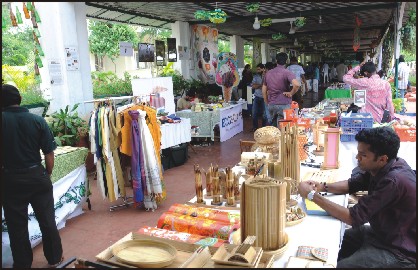Artisans from across India have set up stalls in the mela Green Mela to be held bimonthly from December
Mysore :
A three-day organic products fair ‘Green Mela,’ organised by The Green Hotel on Hunsur Road began at its premises here yesterday.
The mela was inaugurated by Prof.U.N.Ravikumar, who is well-known in the field of conserving lakes, rain water harvesting and sustainable development.
Speaking to SOM, Prof.Ravikumar said “If rural India has to go on a greener path, urban Indians should lead the path by showing them non-wasteful consumption methods.”
General Manager of the Hotel Mithun said, “I am thrilled by the overwhelming response by the public who are thronging the mela.” He also said that artisans from across India have set up their stalls in the mela and from December onwards the Green Hotel will conduct Green Mela bimonthly.
The products which are on display and for sale at the mela include Avocado pickles, Bamboo pens, Bamboo lamp shades, Coir pots, Natural ice-creams, Organic coffee powder from Madikeri, various types of handmade soaps, Pashmina Shawls, Silk Scarves, Singing Bowls, drumstick tambli – a special drink from coastal region which is said to have medicinal values, Audio CD’s of the songs of Adivasis from Adivasi Munnetra Sangam, Gudlur, Tamil Nadu and other items.
The major attraction at the mela is the Pottery workshop in which public can try and experience making pottery using natural clay. The pottery workshop has programmes like ‘Make your own diya’ and ‘Make your own Ganesha.’
Different varieties of organic authentic teas imported from United Kingdom are also available at the mela which include Peppermint tea, Night time tea – an organic oat flower, lavender and limeflower tea for peaceful sleep, Vanilla chai and others.
There is a very special kind of tea at the Mela called ‘Love Tea’ , which has a tagline ‘a tea to warm your heart’. It is made from organic roses, chamomile and lavender.
The mela is open for public from 11 am to 8 pm daily and will conclude on Oct. 12.
source: http://www.starofmysore.com / Star of Mysore / Home>General News / Saturday, October 11th, 2014









